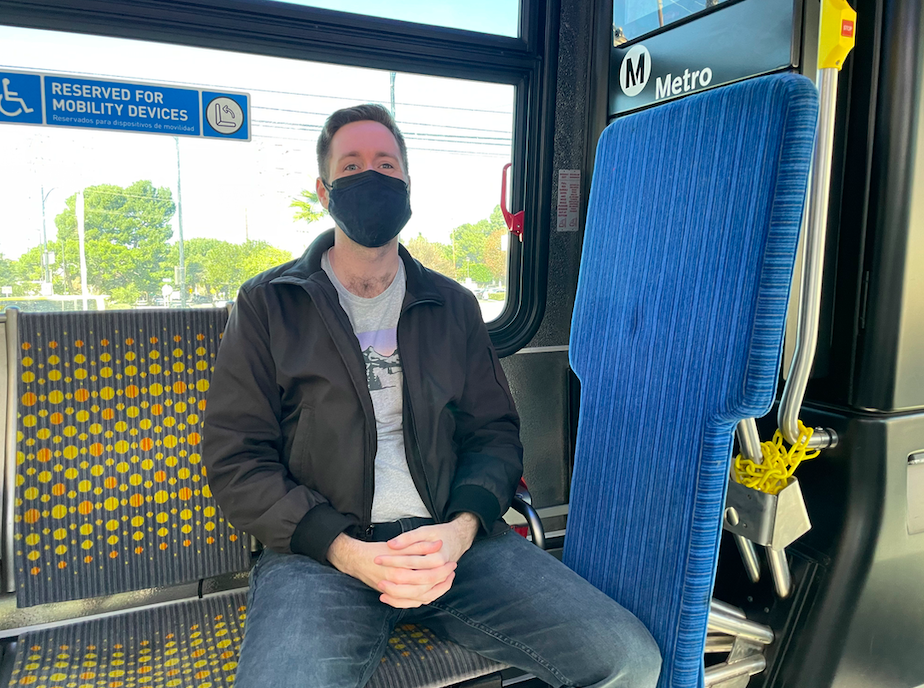He’s at work before 5 a.m. He frequently has to skip breaks, and on what should be his days off, he’s often back on duty. Sometimes the people he serves yell at him, or spit in his face.
The bus driver did not get permission to talk to media, so we’re calling him by his initial, B.
B has worked for LA Metro for more than 30 years, and says he’s not surprised the agency is losing employees more quickly than it can hire them.
“We're often ignored or often mistreated. Operators who have been here every day since the beginning, a lot of them took off,” this hard-working LA Metro bus driver tells KCRW.
B is the kind of guy you want driving your bus. He says hello to everyone who steps on, he waves through the occasional passenger who can’t find enough change to pay a full fare, and he takes pride in his work.
“I love driving. Dealing with the bad people really makes it hard, but it [just] takes one nice person to start the process again,” he says.
But it’s pretty clear not all of his colleagues like driving as much as he does. LA Metro has more than 3,000 bus operators. They need about 450 more. In December, they hired 11 people – and 32 left.
New bus operators get a starting wage of $19 per hour — that’s a temporary pilot program that’s increasing the wage from $17.75. But minimum wage in Los Angeles is about to bump up to $16 an hour. So $19 doesn’t look as high.
B says more pay would go a long way.
“The thing that has lowered morale is that essential workers were given raises. Nurses, police officers, firefighters, grocery workers, restaurants, they really went out and gave their employees bonuses for coming to work,” B says. “MTA received a lot of money, from what I understand, to help with COVID. So we were all looking forward to a bonus and we never got it. … We're often ignored. We’re often mistreated.”
Last year, the LA area received $3.8 billion in pandemic relief for public transportation. And LA Metro received another $1 billion this year. The agency did not respond to a request for comment.
In the fall, LA Metro canceled about 10% of its bus trips. In January, it canceled nearly 18%. And Metro recently announced that later this month, it’ll cut its bus service by 12% while it tries to fill hundreds of open operator positions. The agency hopes to restore full service by June.
It's not just a lack of drivers that’s forcing bus drivers to cancel trips.
B says when COVID first hit and Metro decreased service, buses ran on new, tighter schedules with fewer minutes between stops. It wasn’t difficult to keep up when there was no traffic and fewer people were stopping the bus to get on and off.
But traffic is back, and B is still expected to stick to that tight schedule. His line used to have several buses on it simultaneously, and now it’s been dropped down to one bus that comes hourly.
“It's hard to keep up because literally I don't take breaks. I have to drive through it,” he says. “If we're running behind schedule, then I don't get a break.”
Passengers have noticed the cutbacks in service.
Brandon Reines lives in North Hollywood and takes the bus as often as he can to avoid driving. Now, even when the transit schedule says his bus is running on time, he’s learned not to trust it.

Brandon Reines says he’s had more buses canceled on him in January than ever before. Photo by Caleigh Wells.
“Especially in the last month of January, about six of my bus trips out of 14 that I took were canceled and it doesn't count two that never showed up, and I had to abort my plans entirely.”
Meanwhile, this month, LA Metro started charging fares again after pausing them because of the pandemic.
“It kind of feels like a slap in the face when it's coming at the same time as fares being reinstated,” he says. “If you can't even run the buses that are posted on your schedule, it really does erode the trust that your riders have in your system very very quickly.”
Part of the problem was a hiring freeze when the pandemic first hit, according to Jessica Meaney at Investing in Place, an LA-based transportation advocacy group.
“When they realized they needed more buses … everybody realized they had lost a ton of bus drivers throughout the pandemic.”
Last month the federal government awarded LA Metro more than $1 billion to help pay for pandemic expenses. The agency says the current service cuts will hopefully result in fewer canceled bus trips.
“What really frustrates me is the funding is there,” says Meaney. “The riders are there. There's just no one to drive them.”
